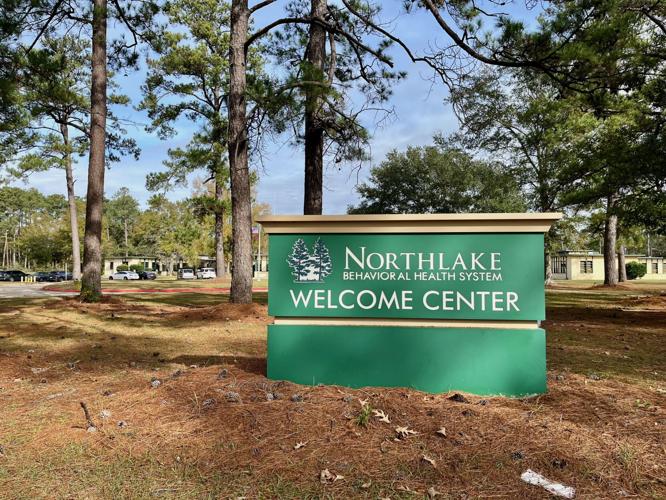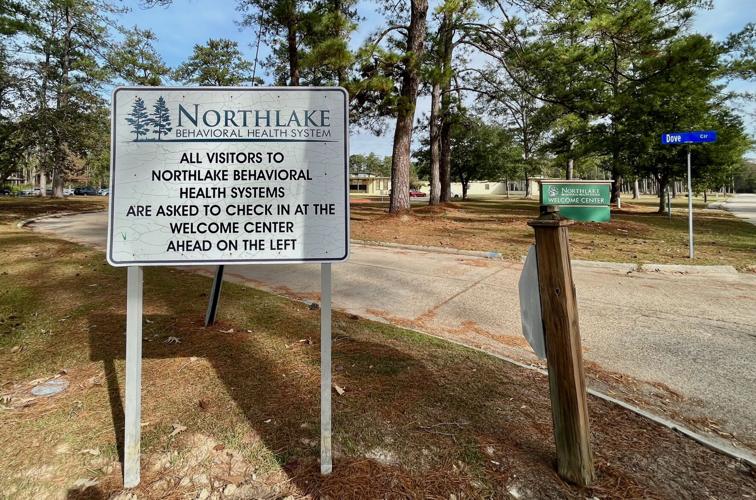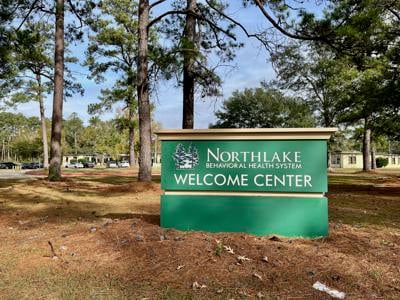It had been less than three years since the teenager from Jefferson Parish was charged with murdering his father. The killing was brutal — he used a spear and a baseball bat — and the boy said he enjoyed it.
He bragged to other patients at Northlake Behavioral Health, a psychiatric hospital in Mandeville, about how he had done it. He told a doctor, a nurse and his therapist at Northlake, where he was in the adolescent ward, that he wanted to kill again.
On April 22, 2022, the staff physician at Northlake issued a stark warning to staff, emphasizing the youth’s “homicidal potential.” The note emphasized “the importance of not walking in front of him” — the fourth of six notices the doctor circulated about the patient that month. The boy was supposed to have constant one-on-one supervision, meaning staff had to be within 6 feet of him at all times.
The next day, video cameras at Northlake recorded the boy walking unattended through the halls of the facility. He approached another patient from behind and put him in a chokehold for more than a minute. The patient went limp. His head “bounced as it hit the floor,” according to a federal inspection report.
Two minutes later, a technician at Northlake found the patient regaining consciousness. He had urinated on himself. That staffer did not immediately call a doctor, though Northlake’s policies required it.
The youth expressed “absolutely no remorse” over the assault, according to the federal report.
Staff who worked at Northlake at the time recall the incident with horror.
“He was very, very sick,” Amy Adams, a former nurse at Northlake, said of the young assailant. “He wasn’t getting any therapy. He certainly wasn’t getting any education. So he was just sitting there with his thoughts.”
Like most patients at Northlake, the teen was under an involuntary commitment order, Northlake officials said, and so did not choose to receive care there.
The hospital lost its accreditation last year, and inspection reports from the federal Center for Medicare and Medicaid Service, known as CMS, indicate that the facility has repeatedly failed to meet safety standards since then. In interviews with The Times-Picayune, seven former workers said the facility falls short in various ways.
Joe Buckley, CEO of Ness Healthcare, the Mandeville-based nonprofit that runs Northlake, defended the hospital's record and said Northlake has to deal with unusually challenging patients.
“The health care that we do here is extremely dangerous,” Buckley said. “We provide beautiful services, great care. Unfortunately, anywhere things could happen.”
Dozens of incidents
The 2022 attack is just one of dozens of troubling incidents detailed in federal inspection reports obtained by The Times-Picayune. They reveal a facility in which conditions are so dire that patients’ lives can be placed at risk.
CMS began inspecting the facility only after Northlake lost its accreditation from the nonprofit Joint Commission, which oversees performance at hospitals nationwide, in April 2022, the month of the attack. Accreditation allows hospitals to collect Medicaid and Medicare reimbursements.
The Joint Commission doesn't make public how many hospitals lose their "gold seal of approval, as Northlake did. But only six of 3,800 hospitals are currently on track to lose accreditation, according to data on the commission's website.
If a hospital loses accreditation, it indicates that it failed to meet the Joint Commission’s standards. Those “relate to the mechanisms for assurance of patient safety, including the reporting of so-called ‘sentinel events,’ which are essentially when something really bad happens to a patient at the institution,” said Richard Culbertson, director of the health policy and systems management program at the LSU School of Public Health.
Buckley said Northlake lost its accreditation in part due to the age of its facilities. “These facilities were built before anyone could spell ‘Joint Commission,’” he said. “One of the requests from Joint Commission is that we raise the ceiling height.” That was cost-prohibitive, he added.
But the reasons the Joint Commission listed for denying Northlake its accreditation extend far beyond the condition of the buildings. It found the facility did not “minimize the possibility of transmitting infections,” keep proper records of patient care, conduct fire drills or manage fire risk, safely store medication, provide “resuscitation services” throughout the hospital, or “reduce the risk for suicide,” among a 59-point list of justifications.
Though Northlake lost its accreditation, the Louisiana Department of Health has allowed it to continue to collect Medicaid and Medicare reimbursements, according to CMS. Losing that ability could be a death knell for a hospital like Northlake, where many patients rely on some form of federally subsidized healthcare.
Kevin Litten, LDH’s press secretary, said that his agency had “requested a timeline from Northlake for re-accreditation,” and Northlake has told the agency it is “exploring options for obtaining accreditation from another organization.”
The New Orleans metro area suffers from a lack of in-patient psychiatric beds, particularly for adolescents. Patient advocates and former Northlake staffers suspect the state might be incentivized to keep Northlake running because the beds are so sorely needed — even if the LDH understands the facility is not meeting accepted standards of care.
Litten said that LDH values hospitals “that are able to provide critical inpatient behavioral health services.”
The northshore didn’t always suffer from such a lack of psychiatric health services. In fact, the very building in which Northlake now operates, off U.S. 190 in the Mandeville area, was for decades the site of a sprawling state-run psychiatric hospital.
‘We’re going to send you to Mandeville’
Southeast Louisiana Hospital was the largest in-patient mental health institution in the region, famously hosting former Gov. Earl K. Long, who was committed there while in office in 1959. To “send someone to Mandeville” became a well-known expression.
“It obviously had a negative connotation,” said Nick Richard, executive director of St. Tammany Parish’s chapter of the National Alliance on Mental Illness. “They used it to say, you know, you're acting bad or you're acting off. ‘We’re going to send you to Mandeville.’”

A sign instructs patients and their visitors to check in at Northlake Behavioral Health Center in Mandeville.
Then-Gov. Bobby Jindal moved to privatize the public hospital in 2012 as part of a push toward smaller government — an achievement he would tout during his presidential run three years later.
The old public hospital was carved into pieces. One part, now called Safe Haven, was taken over by St. Tammany Parish government, and eventually shuttered.
Another part of the hospital became a public school. Yet another piece of the site is now occupied by NAMI’s St. Tammany chapter.
Northlake would eventually take over 140 in-patient beds on a 40-acre site. They are regularly filled with patients from around the New Orleans metro area.
In recent years, conditions inside Northlake have deteriorated, federal inspection reports show.
A June 2023 inspection report from CMS found that — more than a year after the alarming near-homicide — nurses were still failing to maintain one-on-one supervision for patients for whom it was required.
Other reports this year cited other ways in which the facilities were unsafe. One inspection identified a phone cord longer than 3 feet — which federal inspectors identified as a “ligature risk,” usable for “hanging or strangulation” — and found mold was present in the facility. Psychiatric drugs were left unlocked.
“The facility is exceedingly dated,” a former staffer said. The attitude toward maintenance, from management, was “Just fix it for now,” she said.
Former staffers complained about bats and raccoons in the facility; Northlake initially denied the allegations but then acknowledged one incident involving a bat and one involving a raccoon.
But the bigger problems seem to involve staffing. On March 30, a CMS report identified a condition of “immediate jeopardy” — a federal red-alert status in which the hospital “has placed the health and safety of recipients in its care at risk for serious injury, serious harm, serious impairment or death,” according to CMS regulations — because Northlake didn’t have enough trained staff on site.
The report indicates that Northlake had 201 employees involved in patient care. More than half didn’t have CPR certification, a key skill for any nurse or medical aide.
And LDH indicated that Northlake had been fined for failing to report an allegation of sexual assault to authorities, as required by law. “In this case, the hospital received a civil monetary fine issued by LDH for violations of CMS federal regulations,” Litten said.
Since the hospital was privatized, it’s almost certainly become harder for state agencies to monitor the conditions in the facility, said Jan Moller, executive director of the Louisiana Budget Project, a nonprofit that advocates for the interests of people of modest means.
“Louisiana used to have a lot of uninsured people and a pretty broad, underfunded, definitely imperfect, but state-owned public safety net,” he said. “But there was also a measure of accountability in that system that is hard to capture when you have a privatized system like we do now.”
‘I would not be a patient there’
Seven former Northlake staff members who spoke with The Times-Picayune described a hospital in disrepair, where patients' needs were not always met. Several said they were encouraged to do things that violated their professional standards.
“They are so desperate for employees,” Adams, the former nurse, said. “Every day it’s a staffing nightmare. They’re scrambling and they’re spread so thin.”
“I felt like I was in a horror film every day,” she added.
“They didn’t drug-test,” another former nurse said. “I thought that was crazy, because you need to know if anybody you hire was doing drugs if they’re going to be taking care of mental health patients.” Inspection reports also indicate that required background checks did not always happen.
Northlake says every employee gets background checks and drug tests.
“I would not be a patient there,” the former nurse said. “I would not recommend any of my family members be patients there, nor friends. If anybody ever asked whether they should go there, my answer would be ‘No, absolutely not.’”
The hospital operators say they’re making progress.
"The fact is that Mr. Buckley took over in July of 2022. There have been a lot of changes in personnel, and that should be noted,” said Kendrick Hill, the director of the Ness Center, the outpatient mental health treatment center that is also owned by Ness Healthcare and operates next door to Northlake. Of the former employees’ accounts, he said, “Some of this sounds a little bit like sour grapes.”
In spite of their concerns, several former Northlake employees said that, with better management, the facility could provide crucial mental health services for the community.
“What you can see in the facility is the potential for it to be really, really wonderful,” the former nurse said. “Under its current ownership structure, I don’t know that that will ever happen. It’s a really sad situation. We do need the mental health beds.”
Buckley emphasized that Northlake is working to improve and expand its services. “These improvements align with the feedback from former employees, who acknowledged the facility's potential and highlighted the need for positive changes,” he said.



